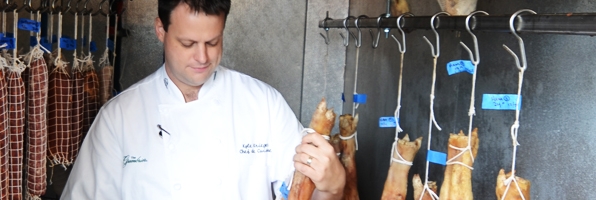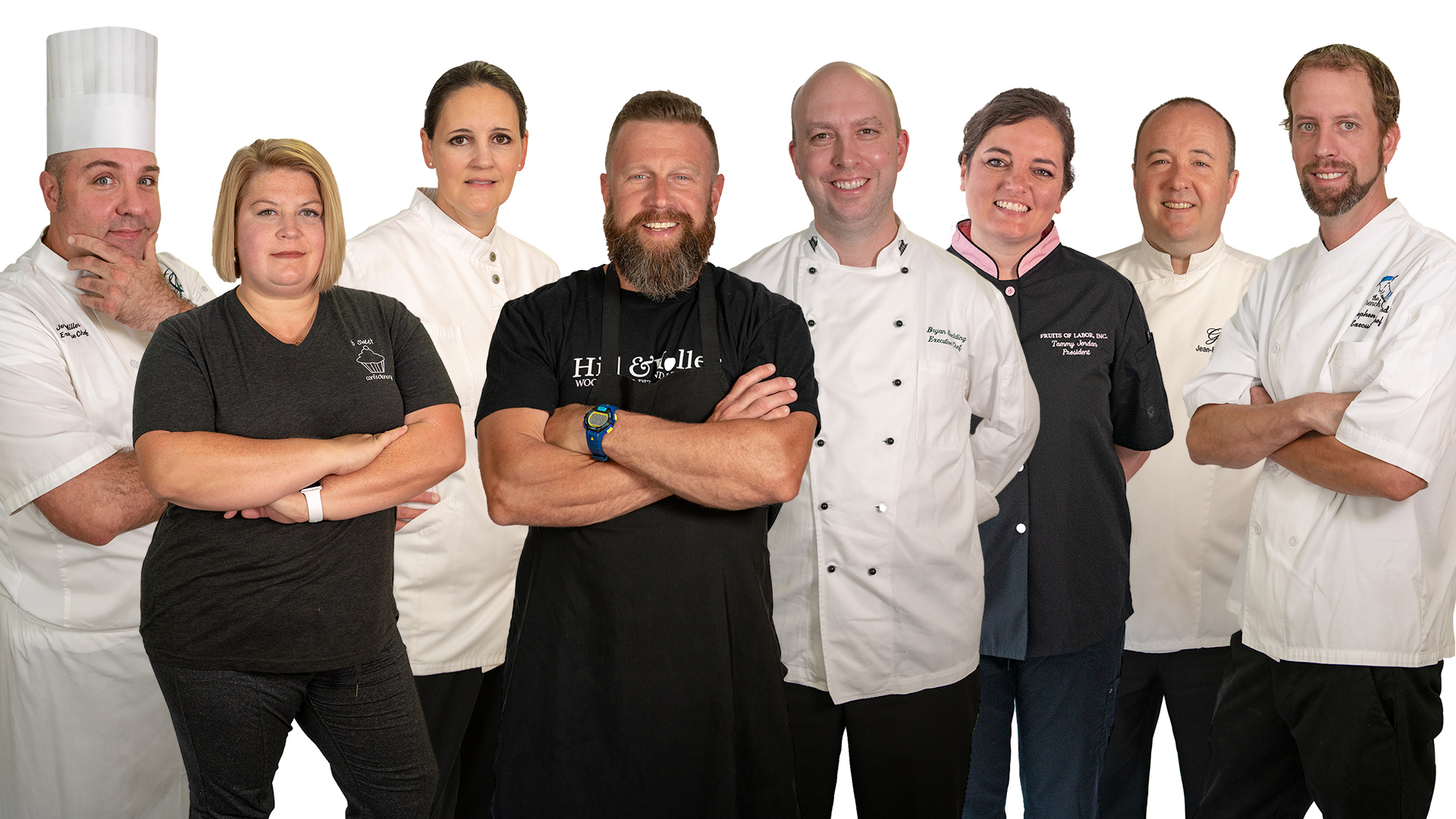Pig Cave Mustard

By Darby Lightfoot
Without the age of the internet, Chef Kyle Krieger says his mustard may never have left the kitchen. What started as a simple accompaniment to his in-house salumi (the umbrella term for all Italian-styled cured meats...including salami) soon took on a life on its own, getting some love from a Kickstarter campaign and a number of local retailers and restaurants.
Krieger says that to really understand the origins of his Pig Cave Mustard, you have to go back to Naples, FL. in the early 2000s. The northwestern Ohio area native and Greenbrier Apprenticeship Program graduate was working at the Ritz-Carlton. The resort made its own ketchup and steak sauce in the kitchen, so naturally one day Krieger decided to try his hand at mustard.
Fast forward a couple of years, and Krieger found himself working a Noble’s Restaurant in Charlotte, N.C., a fine dining establishment in the Tar Heel State when he and a few other chefs began experimenting with curing hams. North Carolina has a long tradition as a premiere purveyor of all things pig, and Krieger and his companions found themselves experimenting with curing processes.
“People have been letting meats sit out to cure for thousands of years,” says Krieger from his home in Caldwell, W.V. “We began by undertaking a lot of research and ultimately developing a red wine and garlic salami for the restaurant.”
At the time, the chefs had been storing the cured meats in the walk-in wine cellar, transforming the restaurant’s “wine cave” into a virtual “pig cave.”
“It got a little ridiculous after a while,” Krieger laughs. “The sommeliers and servers were hitting their heads on the hams every time they walked into the wine room and would come out saying ‘You guys gotta get these hams outta here!’”
So Krieger ventured a few doors down the block and inspected an empty space next to where one of the company’s sister restaurants had recently moved in. The space offered a small walk-in cooler that was perfect for their project, so the team began washing and sanitizing the room during their off time.
A little problem reared its ugly head, however. The entire space lacked power. With a little ingenuity and a generous uncle who sent them a compressor at no cost, the team ran a long extension cord through the ceiling to the other restaurant, plugged it in an outlet and realized the first incarnation of The Pig Cave.
“Every salumi was tasted and if there was any doubt, the whole batch went into the trash,” remembers Krieger. “This crude environment produced pretty good salami, each with its own distinctive characteristics.”
“Over the next 4 years the mustard really evolved into what it is today, albeit with pretty much the same ingredients as its first incarnation.”
“This mustard is very different from the turmeric yellow condiment in squeeze bottles,” notes Krieger. “Pungent, spicy, and bold, it really wakes up the senses and excites the palate. After becoming more involved with charcuterie and salumi, it was noticed that the mustard was a great match with many foods. The recipe was refined until it became what it is today—The Pig Cave Black Mustard.
“It’s a great mustard for sandwiches and brats but it also really shines when using it as an ingredient when cooking,” notes Krieger. “It makes a great honey mustard.”
When Chef Richard Rosendale took the job of Executive Chef at The Greenbrier in 2009, Krieger got a call from the Certified Master Chef with some charcuterie questions. The conversation led to a job offer and Krieger and his wife, a native of White Sulphur Springs, packed their bags and headed back to West Virginia.
Once settled into his new job, Krieger turned to the popular internet crowd funding website Kickstarter, where he raised $5,300 to take the next step in bringing his mustard to the masses.
He approached Three Little Pigs (TLP), a local BBQ sauce and catering company, about renting their kitchen in Maxwelton during the evenings. He then called the WVU Extension Service and got the ball rolling with paperwork and testing.
“The health department paperwork took about a year while WVU did all of the process authority work, where they tested the mustard to the specs of my recipe in a laboratory. Even the FDA paid me a visit and watched me make the mustard from scratch.”
After all of the red tape was out of the way, Krieger ran the mustard through a computer program that allowed him to generate the specific nutritional facts for his label, noted for its gesture drawing of a winged pig with crossed out eyes and a chef’s knife at the ready.
In January of 2013, Krieger’s creation finally got the go ahead from all of the pertinent agencies and the mustard launched on www.thepigcave.com. The Greenbrier immediately began implementing the mustard in a number of their food outlets.
“The Pig Cave Mustard is one of those products where you know the love and attention went into not only the creation of it, but also the making of it,” says Chef Bryan Skelding, Executive Chef at The Greenbrier resort. “The mustard is unique in flavor and spiciness. We use it at the Greenbrier for a condiment with our charcuterie, a component in our vinaigrettes, and also on our gourmet sandwiches.”
Pig Cave Black Mustard can also be found around Lewisburg in a variety of places, including at The Irish Pub on Washington Street where it has a home in their mustard sampler pack customers receive with every order. “Patrick and Andrea were extremely supportive from the beginning,” remembers Krieger.
If you’re looking for it at the retail level, Bella The Corner Gourmet carries the jarred mustard at their fine foods shop in downtown Lewisburg.
“At Bella, we continue to feature The Pig Cave Black Mustard, sharing it with customers and pairing it with salami and other charcuterie,” says Bella proprietor Tamera Pence. “It’s fabulous! The mustard has a very distinct flavor and we work toward keeping this West Virginia product on our shelves, for sure. We appreciate Kyle Krieger, the ‘Pig Cave Creator Extraordinaire’ for his wonderful product.”
Krieger, in turn, appreciates the local support, and hopes to see Pig Cave Mustard grow to a stand-alone business in the coming years.
“Just this morning I got an order for a case from the Black Market Bakery in Irvine, California,” Says Krieger. “And wine shops in Charlotte and other places are beginning to carry it as well.”
If your outside the market, there’s still good news: Pig Cave Black Mustard is available on the company’s website at www.thepigcave.com, as well as t-shirts and other items.




